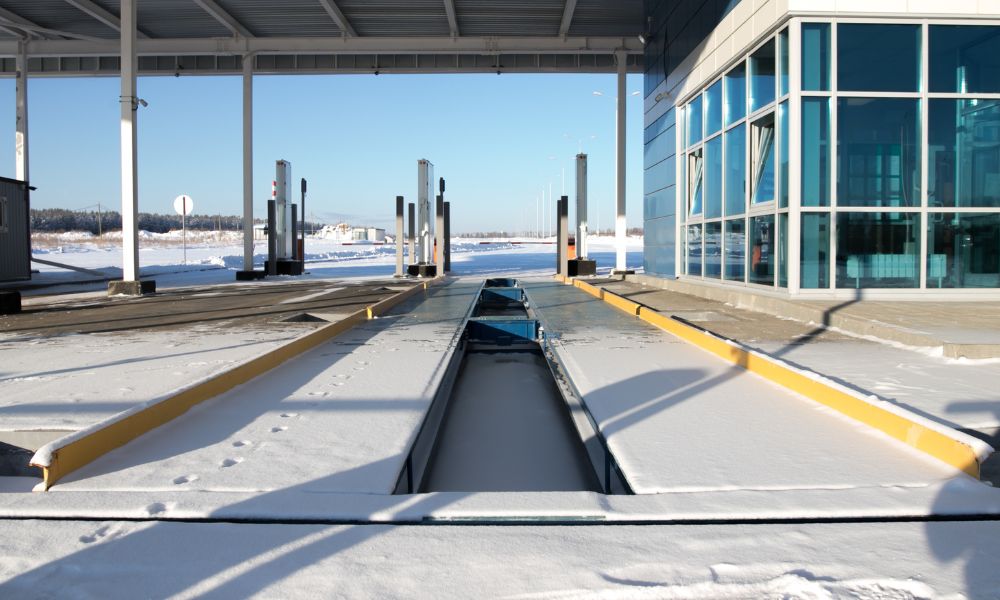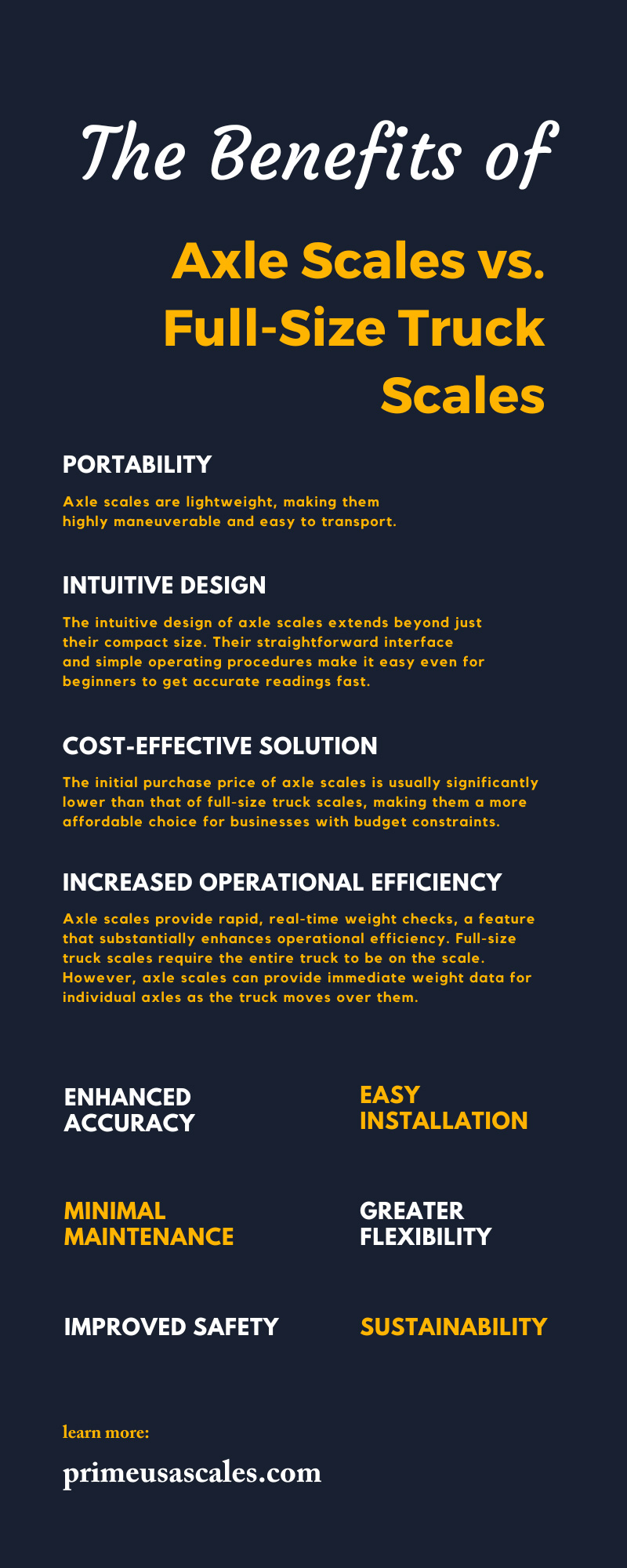As the transport industry continues to evolve, weighing solutions have also undergone innovations to accommodate the expanding needs of users. The transportation industry has long used axle scales and full-size truck scales for their respective advantages in facilitating accurate and safe results. While both are pivotal in ensuring appropriate load management, their inherent differences make them suitable for different situations.
Axle scales have revolutionized the industry, offering many businesses an efficient, economical, and convenient solution. However, traditional full-size truck scales hold their ground on several parameters, including their robustness and ability to provide comprehensive weight measurements.
This in-depth analysis of the benefits of axle scales compared to full-size truck scales will provide valuable information, particularly on aspects like ease of use, cost-effectiveness, accuracy, mobility, and durability. This comparison will enable users in the transport industry to make informed decisions, ensuring their weighing solutions match their specific needs and operational efficiency.
Portability
Axle scales are lightweight, making them highly maneuverable and easy to transport. Their design is typically compact, allowing a single operator to move and set up easily. This means they’re useful in various locations, from the roadside (for enforcement checks) to construction sites, farms, and mining operations.
Despite their compact design, portable axle scales don’t compromise on durability. They use robust materials, such as high-quality steel or aluminum, to ensure they can withstand heavy loads and harsh conditions.
Intuitive Design
The intuitive design of axle scales extends beyond just their compact size. Their straightforward interface and simple operating procedures make it easy even for beginners to get accurate readings fast. This simplicity integrates digital technology, allowing for real-time data transmission and analysis.
The design of axle scales minimizes the need for additional infrastructure, such as large-scale houses or platforms, like full-size truck scales. This enhances their ease of use and installation. Additionally, the design often includes features like ramps for smooth vehicle access and high visibility readouts for clear data display, enhancing overall operation efficiency.
Cost-Effective Solution
The initial purchase price of axle scales is usually significantly lower than that of full-size truck scales, making them a more affordable choice for businesses with budget constraints. However, the cost-effectiveness of axle scales is not only in their purchase price. Their lightweight design requires less space, potentially saving on-site preparation and construction costs.
Also, the operational costs for axle scales are generally lower because their mobility reduces the need to invest in multiple scales for different sites. Their robust and durable construction minimizes the need for expensive repair and maintenance processes common with full-size truck scales.
Enhanced Accuracy
The enhanced accuracy of axle scales primarily comes from their design, which focuses on weighing individual axles rather than the entire truck. This method offers a more detailed picture of the load distribution, which is vital in identifying overloading issues in specific areas.
Modern axle scales utilize high-resolution load cell technology and advanced algorithms, enabling superior weight data accuracy. This ensures precise measurements, reducing the risk of errors that could result in costly fines or vehicle damage.
Easy Installation
Axle scales are appealing to businesses aiming to minimize disruption during installation. This is because of their streamlined design, which significantly reduces the space needed for setup. Unlike full-size truck scales that typically require extensive preparatory work like constructing foundations and ramps, axle scales work on any flat and firm surface.
The installation process of axle scales is remarkably simple; it only requires the placement of the scale on the surface and the connection of the weighing pads to the reading unit. This process doesn’t necessitate specialized personnel or heavy machinery as full-size truck scales do, leading to significant cost and time savings.
Minimal Maintenance
Axle scales typically require less maintenance than their full-size counterparts, contributing to cost-effectiveness. This is largely thanks to their robust design and the high-quality, durable materials in their construction.
Axle scales often have protective features, such as corrosion-resistant coatings and sealed load cells, enhancing their longevity and reducing maintenance needs. Their mechanical simplicity also minimizes the chances of mechanical failure, reducing the need for regular servicing or part replacements.
Increased Operational Efficiency
Axle scales provide rapid, real-time weight checks, a feature that substantially enhances operational efficiency. Full-size truck scales require the entire truck to be on the scale. However, axle scales can provide immediate weight data for individual axles as the truck moves over them.
The digital integration of axle scales facilitates instantaneous data transmission and analysis. Operators can receive immediate feedback on weight distribution and total load, allowing them to make quick adjustments as necessary.
Greater Flexibility
The flexibility of axle scales opens a world of possibilities for various industries. Compact and lightweight, axle scales are easy to transport and use in different locations. This portability enables on-the-spot enforcement checks by roadside regulators, immediate weighing of harvests in agriculture, and quick-load measurements at construction and mining sites.
Axle scales cater to various vehicle types and sizes, from small agricultural vehicles to large commercial trucks. This versatility allows them to function in diverse scenarios and serve different transportation needs.
Improved Safety
Overloading is a common cause of road accidents involving trucks and other heavy-duty vehicles. Excessive load can lead to compromised vehicle control, longer stopping distances, and increased wear and tear, all of which increase the risk of accidents.
One of the main advantages of axle scales vs. full-size truck scales is that they enable operators to ensure load distribution across all axles. This balance is critical, as uneven load distribution can impact vehicle stability, making it difficult to maneuver and posing a potential safety risk.
Sustainability
The environmental benefits of axle scales are plenty, making them attractive choices for businesses prioritizing sustainability. The installation process of axle scales has a minimal environmental footprint. Because axle scales don’t often require extensive site preparation like excavation and concrete work and work on any flat surface, they’re more sustainable.
Their easy setup greatly reduces the amount of earthwork and material use, significantly decreasing associated carbon emissions. The portability of axle scales also minimizes the need to transport vehicles to a specific location for weighing, saving fuel and reducing greenhouse gas emissions.
As the transport industry seeks to optimize operations, streamline processes, and enhance safety, the advantages of axle scales over full-size truck scales become increasingly apparent. Transport operators can enjoy a cost-effective, reliable, user-friendly, and sustainable solution by picking axle scales.
Join the movement toward more efficient and responsible transport. Call us today to explore the multiple scale options for business and consider the switch to axle scales.

